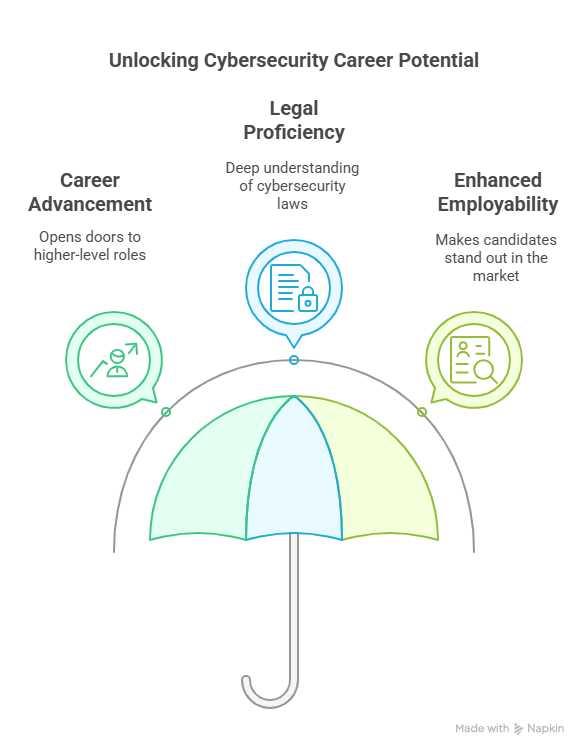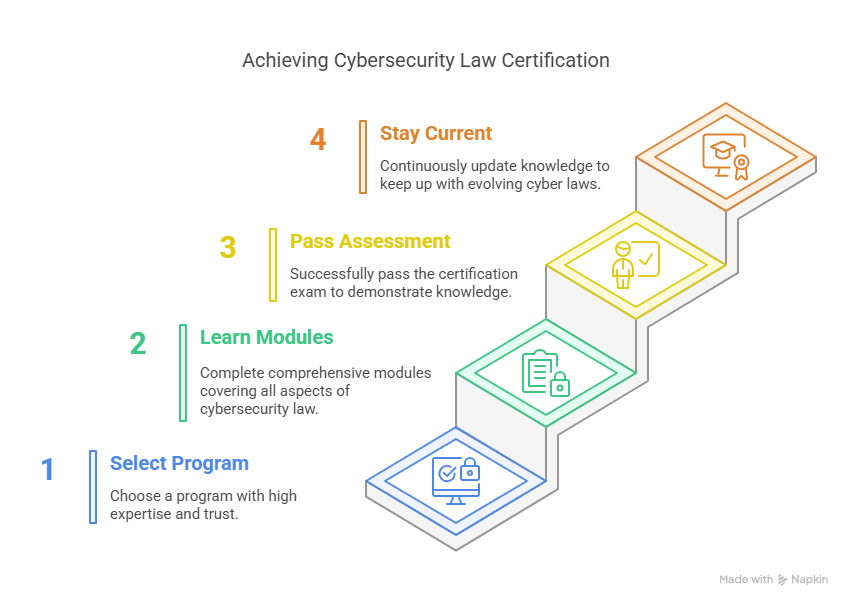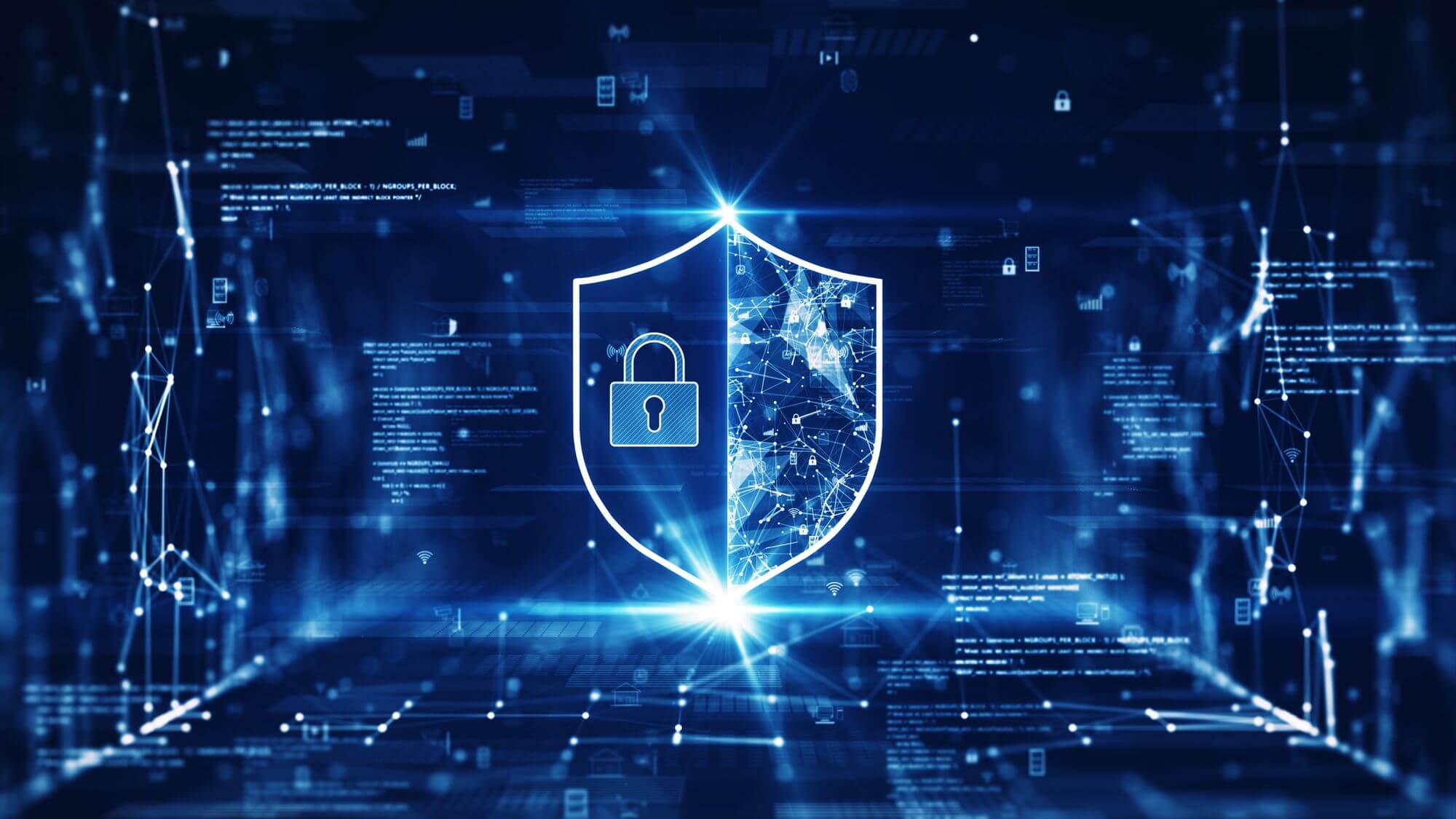Table of Contents
- Why Cybersecurity Law Certification Matters
- What Is a Cybersecurity Law Certification?
- Benefits of Earning a Cybersecurity Law Certification
- What Skills Are Covered in Cybersecurity Law Certification?
- Who Should Pursue Cybersecurity Law Certification?
- How to Get a Cybersecurity Law Certification
- Final Thoughts
- FAQs About Cybersecurity Law Certification
In today’s digital age, cybersecurity is not just about technical measures like firewalls and encryption. As cyber threats grow more sophisticated, legal expertise plays a vital role in safeguarding data and preventing digital crimes. If you’re looking to combine your technical skills with legal knowledge, the Cybersecurity Certification Test offers the perfect solution.
This certification bridges the gap between cybersecurity practices and the legal frameworks that govern them. It equips professionals with the tools to navigate the complexities of cybersecurity laws, making them invaluable assets in any organization. Whether you’re an IT manager looking to stay ahead of the curve or a legal professional seeking to expand into the digital realm, this certification paves the way for a promising career in cybersecurity law.
With an increase in cyber threats and stricter regulatory compliance mandates, earning a Cybersecurity Certification Test ensures that you remain relevant and in-demand in any industry. Read on to explore why this certification matters, how to get started, and how platforms like ACSMI can help propel your career forward.
Why Cybersecurity Law Certification Matters
The rise of cyber threats has changed the landscape of data protection. It’s no longer enough to rely solely on technical measures—understanding the legal and regulatory frameworks for data protection is just as essential. This is where the Cybersecurity Law Certification comes into play.
This certification gives professionals the expertise to handle legal scenarios surrounding cybercrimes, data breaches, privacy rights, and ethical hacking. Industries like healthcare, fintech, and government that deal with stringent cybersecurity regulations greatly benefit from professionals who understand the intersection of law and technology.
What Is a Cybersecurity Law Certification?
The Cybersecurity Law Certification recognizes individuals who possess comprehensive knowledge of cybersecurity laws, both local and international. This credential is ideal for legal professionals, IT managers, compliance officers, and cyber investigators who aim to bridge the gap between cybersecurity measures and legal requirements.
Core focuses of the certification include:
-
Understanding of cybersecurity regulations
-
Techniques for ensuring regulatory compliance
-
Identifying legal risks in cyber incidents
Organizations across the globe are increasingly seeking certified professionals to ensure compliance with data protection regulations. With data breaches costing billions each year, employers are prioritizing hiring legally-versed cybersecurity experts.
Benefits of Earning a Cybersecurity Law Certification
Earning a Cybersecurity Law Certification offers a wealth of benefits, from career advancement to enhanced job security. Here’s why this credential is a game-changer:

1. Career Advancement
Specialized knowledge in cybersecurity law positions you for growth in the booming cybersecurity job market, opening doors to higher-level roles in both the tech and legal fields.
2. Legal Proficiency in Cybersecurity
By earning this certification, you’ll gain a deep understanding of privacy laws, GDPR, and other cybersecurity policies, keeping you ahead of emerging legal challenges in the digital world.
3. Enhanced Employability
In a competitive job market, It Specialist Cybersecurity Certification ensures you stand out, especially in industries where legal compliance is crucial for business operations. You can access top-tier cybersecurity law certifications through platforms like ACSMI, which offers over 400 modules dedicated to cybersecurity law compliance.
What Skills Are Covered in Cybersecurity Law Certification?
Completing the Cybersecurity Law Certification covers a wide range of essential skills and knowledge areas, including:
-
Cybercrime Investigation Techniques: Learn how to investigate and handle cybercrime incidents.
-
International Data Privacy Protocols: Understand data protection laws globally, including GDPR, CCPA, and HIPAA.
-
Regulatory Frameworks: Gain proficiency in key frameworks like GDPR, HIPAA, and PCI DSS.
-
Contract Liabilities: Explore legal liabilities in software licensing, cloud services, and vendor agreements.
Mastering these skills ensures that you are well-prepared to manage compliance programs and consult on ethical hacking policies, making you a highly sought-after professional in the cybersecurity and legal fields.
Who Should Pursue Cybersecurity Law Certification?
This certification is ideal for professionals in the following fields:
-
Legal Practitioners: Gain a deeper understanding of IT laws and how they intersect with cybersecurity.
-
Compliance Officers: Ensure your organization adheres to international data protection standards.
-
Cybersecurity Analysts: Develop expertise in the intersection of technical and legal practices.
-
Ethical Hackers: Understand the legal justifications for conducting breach tests and other security measures.
Leaders in any industry facing high levels of cybercrime scrutiny can leverage this certification to make informed, legally sound decisions regarding digital security.
How to Get a Cybersecurity Law Certification
The path to earning the Cybersecurity Law Certification involves structured education and practical applications. Here’s how you can start:

1. Select the Right Program
Choose a program with high E.A.T. (expertise, authoritativeness, and trust). Platforms like ACSMI offer detailed courses recognized in the industry.
2. Learn Core Modules
ACSMI’s 400+ modules cover the full spectrum of technical, legal, and managerial aspects of cybersecurity law.
3. Pass the Assessment
Most certifications include an exam that tests your knowledge of IT law and cybersecurity principles.
4. Stay Current
Cyber laws evolve rapidly, so staying updated through continuous learning and certification renewals is crucial to remain competitive.
Final Thoughts
The Cybersecurity Law Certification is more than just a credential—it’s a critical career step in today’s rapidly evolving digital world. By mastering the intersection of legal and technical knowledge, you position yourself as an indispensable asset to organizations facing cyber challenges.
Investing in a Cybersecurity Law Certification through platforms like ACSMI ensures that you’re not just equipped with knowledge but with real-world skills that employers value. Start your journey towards professional excellence today and become part of a growing field where data security is not just about technology but about the law.
For more information and to begin your certification journey, visit ACSMI’s platform and take the first step toward securing a future in Cybersecurity Law.
FAQs About Cybersecurity Law Certification
1. What does the Cybersecurity Law Certification include?
This certification focuses on global cybersecurity laws, regulations, and best practices to help you manage legal cases related to digital incidents.
2. Do you need prior IT knowledge?
While not mandatory, having a basic understanding of IT networks or legal principles will help you grasp advanced concepts more effectively.
3. Which industries prioritize this certification?
Industries like healthcare, banking, government, and IT consultancies highly value this certification to ensure compliance with strict regulatory requirements.
4. How long does it take to complete?
Most programs range from a few weeks to six months, depending on the provider and your study pace.
5. Are online options available?
Yes, online certification programs like ACSMI offer flexible learning options, allowing you to earn your certification at your own pace.
6. Is Cybersecurity Law Certification globally recognized?
Yes, many certifications, including those from ACSMI, meet international standards and cover globally relevant regulations such as GDPR and HIPAA, making them valuable worldwide.
7. What is the cost of obtaining a Cybersecurity Law Certification?
Costs vary by provider. ACSMI offers tiered pricing, with modules starting from a few hundred dollars to a few thousand, depending on access and additional benefits like exam fees or study resources.

Leave a Reply